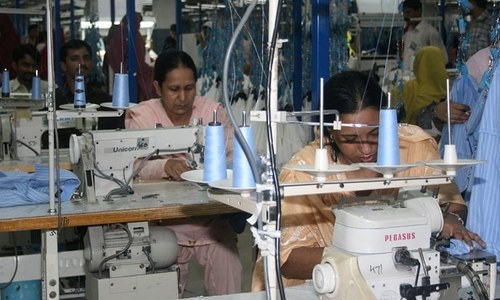KARACHI: Notwithstanding the quarter-page newspaper ads from industrialists gushing about the government for its support during the pandemic, garment factory workers faced a high level of wage theft throughout 2020 and beyond.
According to a 193-page report on Covid-19–related wage theft in the global garment supply chains released by the Asia Floor Wage Alliance (AFWA) on Thursday, factory owners in Pakistan denied more than $85 million in wages to 244,510 workers from a sample of 50 industrial units in the name of order cancellations and non-payment for existing orders from global brands.
The denial of wages and benefits rightfully owed to employees constitutes wage theft.
“Even though (it) peaked in April 2020, workers consistently experienced wage theft throughout the year and well into 2021, with no real sign of recovery,” said the report, which is based on a survey of 605 workers from 50 garment factories in Karachi, Lahore and Faisalabad. About 96 per cent of these factories employed more than 1,000 employees.
Workers reported an overall wage theft of 29pc in 2020, with a sharp decline of 61-69pc in wages in the total lockdown (March-May) and 26pc in the partial lockdown (June-October).
All garment factory workers experienced employment shocks in the form of either layoffs (86pc) or terminations (14pc), the survey revealed. About 81pc of the workers were pushed below the World Bank-determined poverty line, measured at $3.20 a day on a purchasing power parity basis, between March and May of 2020.
The survey revealed that workers with five years of work experience did not have enough savings to tide over even a one-month layoff period without reducing consumption, incurring debt or selling assets.
Using foreign trade numbers from the UN Comtrade Database, the study noted exports declined 67pc and 40pc in April and May 2020 on an annual basis. However, garment exports registered a positive growth rate from mid-June and outpaced the 2019 figures from September owing to trade relaxations and incentives for garment exporters. Therefore, overall exports in 2020 declined by 2pc. “Wages never recovered to the pre-pandemic levels in 2020 as workers continued to experience wage theft of around 5pc during the post-lockdown period.”
Interviews revealed most garment workers were laid off for one or two months and did not receive any monetary support from any source during this period.
Most workers who were terminated did not receive the legally mandated severance payments. Those who were re-employed later reported an increase in the unpaid overtime compared with the preceding year.
Subsidised loans not used effectively
The State Bank of Pakistan approved subsidised loans amounting to Rs238bn for wages in 2020. But the benefits from these programmes were not effectively transferred to the workers in the form of wages, the report said.
At the peak of the crisis in April 2020, 88pc of the respondents were laid off. About 67pc of the respondents still had no job in May. The layoff trend declined after June, although 11pc of the workers were still unemployed by the end of 2020. About 86pc of the terminated workers did not receive their termination benefits and legal layoff wages.
Although employers must pay twice the regular hourly rate for overtime work, no worker interviewed as part of the survey was paid for their overtime at the legally mandated rate even during the pre-pandemic period.
Regular workers are entitled to health services and cash benefits from the provincial-level Employees’ Social Security Institutions or ESSIs (PESSI in Punjab and SESSI in Sindh). Employers are required to contribute to both schemes under the law. But around 65pc of the workers did not receive any social security benefits even in the pre-pandemic period, the report said. These numbers “significantly increased during the lockdown,” with around 80pc of the workers reporting that they did not receive SESSI/PESSI contributions in April and May.
Published in Dawn, July 9th, 2021















































